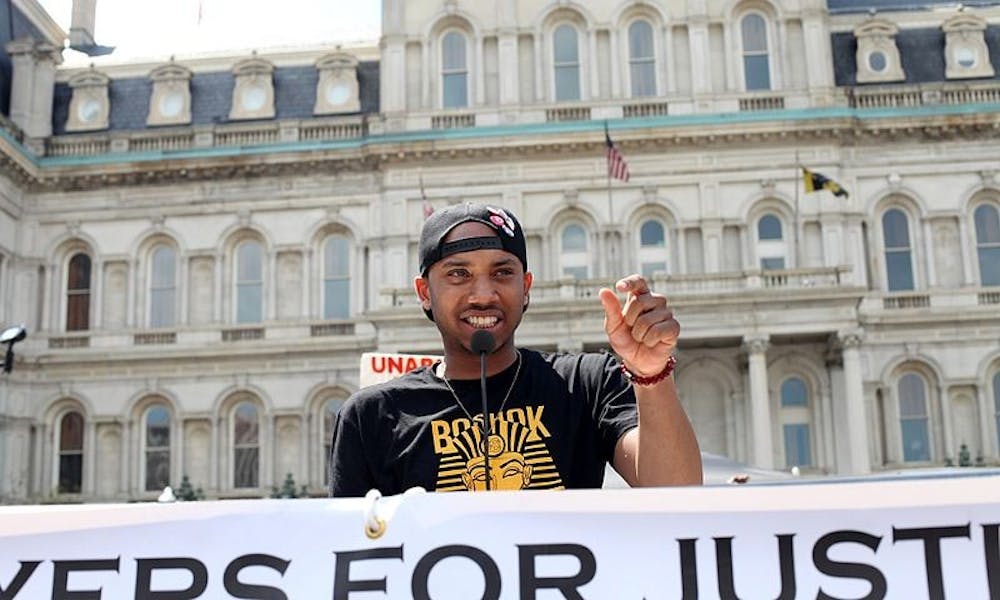More than two years have passed since his death, but Freddie Gray still lives on in Baltimore. Just last week, one of the officers involved in Gray’s death, Lieutenant Brian Rice, was cleared of administrative charges. Rice, along with three other officers complicit in Gray’s death, beat the case against him, in what many Baltimoreans saw as a gross miscarriage of justice.
Rice’s exoneration is a timely reminder of Gray’s legacy and of the events that followed his death. This is the subject of the newly released HBO documentary Baltimore Rising. The film, released on Nov. 20, 2017, is centered around both activists and police. It examines their lives as both individuals and community leaders in the context of the 2015 Baltimore Uprising and its aftermath.
Baltimore Rising is more about individuals than the movement as a whole. Thankfully, the riots themselves were nothing more than an introduction to the film, a means to introduce some of the central characters. Kwame Rose is an activist famous for his confrontation with the mustachioed pond of rancid effluent that is Geraldo Rivera. Baltimore Police Chief Melvin Russell is the head of the department’s Community Collaboration Division, which conducts outreach as an alternative to traditional policing. Early in the film, Chief Russell tells us that we’re in city that’s “underserved and overpoliced,” setting the tone for what is to come.
As the film progresses, we are introduced to more activists and police. Makayla Gilliam-Price was still in high school during the Baltimore Uprising but became one of the leading Black Lives Matter organizers in the city. Adam Jackson is the CEO and Dayvon Love is the director of public policy for Leaders of a Beautiful Struggle, which, among other things, advocates for legal reforms that will benefit black people victimized by injustice.
Baltimore Rising approaches the Uprising from an interesting perspective. It combines its own work with news clippings and social media videos to chart the progress of the movement in the aftermath of Gray’s death. The film also delves into the lives of its subjects, particularly Rose and Gilliam-Price.
During filming, Rose was arrested twice, both times for charges stemming from his involvement in protests. The filmmakers follow both Rose’s organizing efforts and his legal struggles, as well as the strain his arrest puts on his family. Rose is frank and open about his personal life and the concessions he has made in pursuit of social justice.
Makayla Gilliam-Price, just 17 during the protests, had to strike a difficult balance between her work as an organizer and her life as high school student nearing graduation. The film crew witnesses the friction between Gilliam-Price and her mother that stems from the former’s dichotomous and often incompatible life.
Detective Dawnyell Taylor was the lead investigator into Freddie Gray’s death. She also provided a tense testimony at the trial of Officer Caesar Goodson Jr. Current Baltimore City Police Commissioner Kevin Davis is also featured in the film, although more in relation to his discussions with activists than as a subject in and of himself.
It seems fair to say that most politically active Baltimoreans have heard of Kwame Rose and Makayla Gilliam-Price, but this might not be the case for Genard Barr.
Genard “Shadow” Barr is an activist and former gang member who works as an addiction recovery specialist at the Penn North Recovery Center. Barr’s perspective is entirely unique. He is first introduced during a tense meeting between community leaders and Commissioner Davis, organized by Chief Russell. Barr is portrayed as someone with a nuanced understanding of the burdens that young black people in Baltimore carry and as an advocate who speaks truth to power. Barr and Chief Russell work together closely throughout the period documented in the film, bridging the immense gap between police and the people.
Interestingly, the film was directed by Sonja Sohn, one of the stars of The Wire, a show that has become synonymous with the national idea of Baltimore. Another Wire alum, the writer George Pelecanos, was a producer of the film. I was originally apprehensive about the documentary’s connection to The Wire. The show has a complex relationship with Baltimore, often associated with negative stereotypes of the city, the same stereotypes cited by blatant racists — like Donald Trump — who gleefully reference the “inner cities” as an emblem of America’s decline.
But Sohn is herself an activist; after The Wire came to an end, Sohn stayed in Baltimore and founded the nonprofit ReWired For Change, which works with at-risk youth in the city. So while this movie was aggressively advertised as being directed by Sonja Sohn of The Wire, perhaps it’s better to say that it was directed by Sonja Sohn the activist.
Baltimore Rising, while flawed, offers unique insight into the struggle and the lives of those who lead and continue to lead it. Aesthetically, the film bucks stereotypes by not portraying Baltimore in the usual dystopian, post-apocalyptic fashion.The filmography actually appreciates Baltimore’s often ignored beauty.
Baltimore Sun television critic David Zurawik said that he felt that the film was somewhat too forgiving to Baltimore’s police, a sentiment with which I would agree. While policemen like Chief Russell are no doubt working to improve policing for the benefit of the people, the flawed reality of Baltimore's Police Department should not be ignored. No more than several days ago, the police virtually imprisoned an entire neighborhood in response to the murder of a homicide detective.
Nonetheless, Baltimore Rising is a good documentary. It celebrates the lives and the work of black activists in a sensitive and nuanced way. The film is a story of imperfect people fighting for a perfect cause. It does mythologize its subjects, but it also humanizes them, which makes their accomplishments all the more impressive.

















